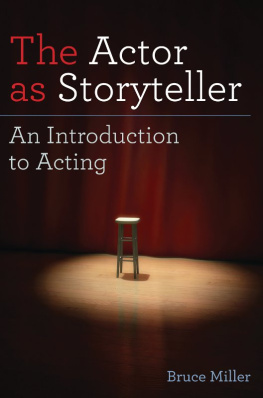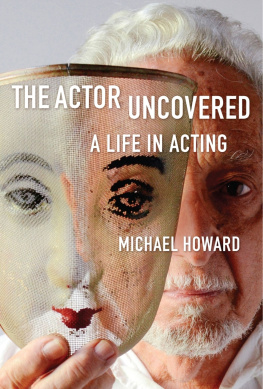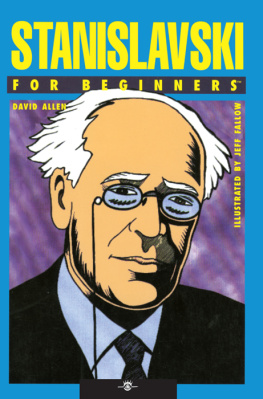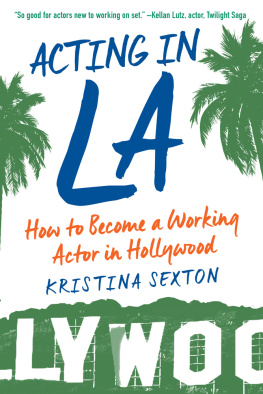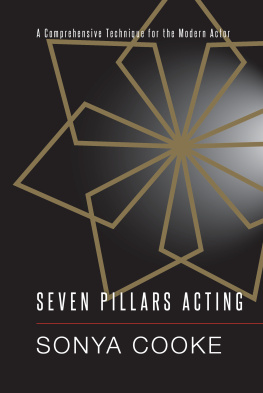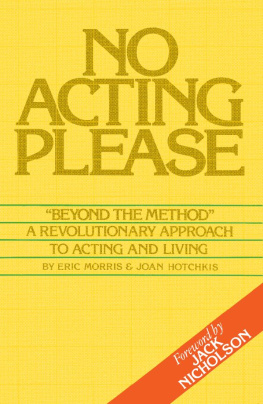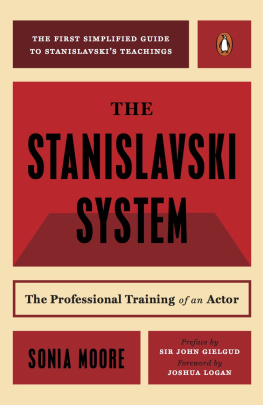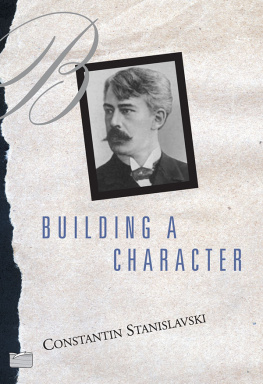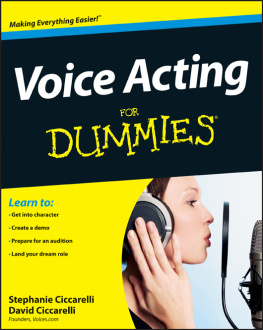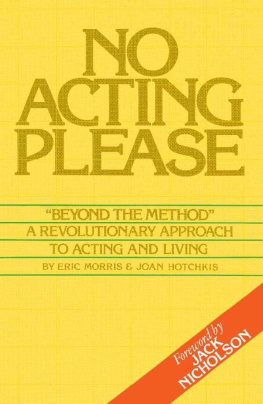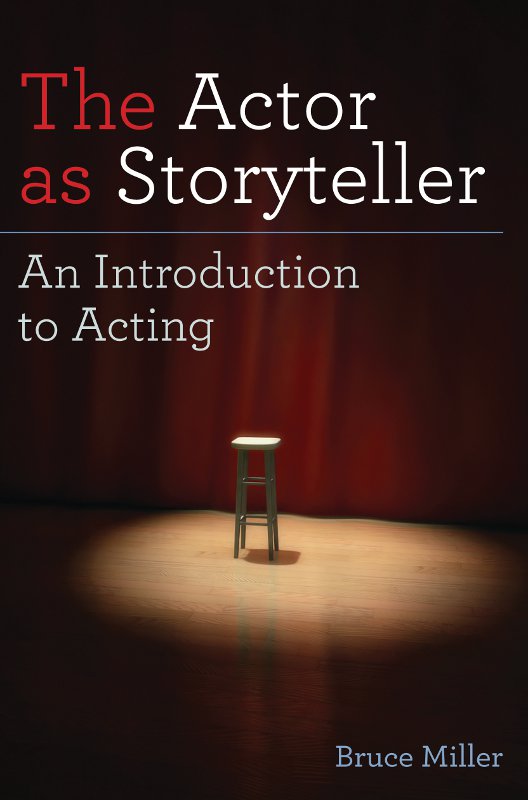
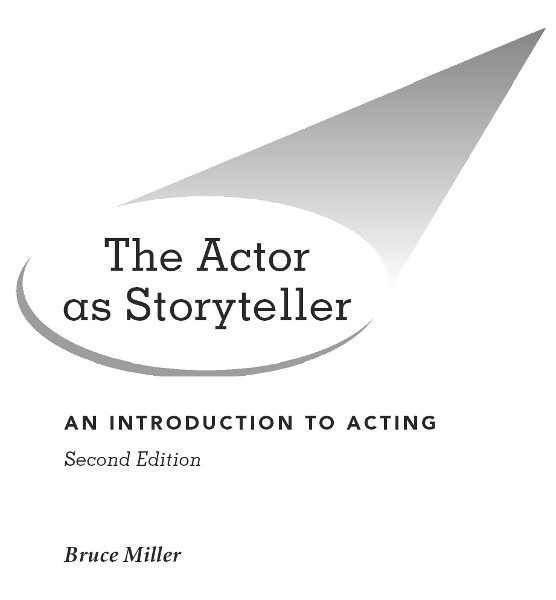
Copyright 2000, 2012 by Bruce Miller
All rights reserved. No part of this book may be reproduced in any form, without written permission, except by a newspaper or magazine reviewer who wishes to quote brief passages in connection with a review.
Second edition published in 2012 by
Limelight Editions
An Imprint of Hal Leonard Corporation
7777 West Bluemound Road
Milwaukee, WI 53213
Trade Book Division Editorial Offices
33 Plymouth St.,Montclair, NJ 07042
Originally published in 2000 by Mayfield Publishing Company
Parts of this book first appeared in some form in Dramatics magazine or Teaching Theatre journal.
Library of Congress Cataloging-in-Publication Data
Miller, Bruce J.
The actor as storyteller : an introduction to acting / Bruce Miller.
2nd ed.
p. cm.
Originally published: Mountain View, CA : Mayfield Pub., 2000.
Includes -->.
ISBN 978-0-87910-386-6 (pbk.)
1. Acting. I. Title.=20
PN2061.M46 2012
792.02'8dc23
2011048679
ISBN 978-0-87910-386-6
www.limelighteditions.com
To Jever an inspiration
Also by Bruce Miller
Head-First Acting
The Scene Study Book
Acting Solo
Actors Alchemy
Contents
What you will find in this text may not be revolutionary or earth-shattering in and of itself. I did not invent the stuff I teach. Stanislavski, the father of all acting craft, must be credited with that. But over the last twenty-five years or so I have learned to articulate basic acting craft in a way that is simple, direct, and immediate. These techniques are practical and broadly applicable, and they will not need to be jettisoned when you are ready for a more sophisticated and deeper exploration of dramatic works.
My approach in teaching and in this text is simply this: The actor is responsible to serve any dramatic situation by making choices that create the best possible story of his or her character, while at the same time serving the overall story of the play, the scene, and every moment. This means that acting requires headwork first. Actors must be able to think about how they serve the plays they are in. In short, they must understand what theatre is, how it works, and how to analyze and synthesize the content of a script. Movies and televisionalong with the development of method actinghave created for would-be actors the illusion that being believable and spontaneous from moment to moment is all that is required. For many aspiring actors this has translated into self-indulgent emotionalism, often at the expense of a script. It has also led actors away from the belief that acting is a craft with specific, tangible, intellectual tools that can and must be developed. These tools include the use of common sense to weigh, choose, and refine your options as an actor in order to serve the playwrights vision and that of the production being rehearsed.
Most high school actors who are serious about careers in acting enroll in college theatre programs to learn about the craft. Yet, ironically, they often come to study theatre having developed their impressions of what acting is all about by watching television and film. Many have little or no knowledge of theatre and how it works. They do not realize that an actors responsibility is far different in theatre than it is in the other hybrid mediums where most actors end up workingif they are lucky enough to find work at all.
This text, then, is intended for serious beginning actors. The first part consists of an overview: what theatre is and how it works, the differences between theatre and its hybrid mediums, and the part an actor plays in each of those mediums. It also introduces ways that novice acting students can begin to examine the process of acting. The second part of the text focuses on acting craft itself. It introduces the concept of the actor as storyteller and then presents the specific tools an actor works with. The third part details the process an actor can use to prepare for scene work and rehearsals. It offers an organized working plan for using the tools presented in the second part. The fourth part includes discussion of mental preparation, suggestions for auditioning, a process for rehearsing a play, and an overview of the realities of show business.
Note to the Teacher
Although it is the acting student I address throughout most of this book, do understand that Ive kept you, the teacher, in mind as well. In fact, I count on you to balance out what some may at first glance consider to be an unevenly distributed presentation of the process of acting. It is true that my focus leans toward the intellectual side of the acting processto dramatic analysis and synthesis. This is intentional, because I feel that the basics of dealing with a script have not been given enough attention in many other beginning acting texts and in much of the training that beginning actors go through. I do, however, appreciate the importance of inspiration, creative impulse, emotional truth, and simply being in and reacting to the moment. Where I may have underemphasized those aspects of the acting process, I fully expect that you will fill in any gaps with your own expertise and experience. It is my hope that those of you whose philosophy of acting seems to be at odds with my own, as presented in this text, will still be able to see through our differences and take advantage of what is useful to you here.
Features
You will find that this text provides
A sequential approach to acting craft that compounds principles, concepts, and skills and culminates in a detailed representation of an actors responsibilities to a script.
An introduction to what theatre is, how it works, and its connection to the acting process.
A well-reasoned argument for the study of acting through theatre training.
An examination of the differences between stage and film acting.
An examination of the acting process as it relates both to the script and to the audience watching.
An examination of the rehearsal process with regard both to scene work and to the development of a role in a production.
A detailed examination of script analysis of the overall play and of individual scenes.
A sample of an actors script filled with useful script notations.
An introduction to the concept of style and its importance to an actor.
An examination of positive ways to give and receive artistic criticism.
A detailed examination of the audition process from selection of material to its presentation.
An examination of ways to view theatre and the acting process intelligently from an actors perspective.
An examination of the skills and personality traits necessary for success in the world of theatre, including skills not necessarily taught in acting classes.
A glossary of terms (identified in the text with bold type) that reflect important theatrical concepts as well as acting tools that, in combination, can help actors meld their technique with the demands of a script and a theatrical performance.
A detailed listing of other books to augment what is offered here.
Numerous exercises that I have found to be effective in teaching acting concepts or as demonstrations of those concepts. In many cases, I have purposely avoided going into great detail about what will happen during exercises or what will or should be learned from them. My intention has been to provide a framework for discovery and eventual mastery, not a step-by-step prescription.
Next page
